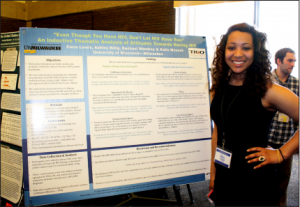By Sarah Mann, College of Letters & Science
The stereotype is that interns only fetch the coffee, but Psychology major Ciera Lewis was counseling people with mental illness and suicidal thoughts rather than making the Starbucks run. Lewis, a senior Psychology student, is fresh off a nine-month internship with the COPE Crisis Hotline in Ozaukee County in southeast Wisconsin. Volunteers and interns with COPE Crisis Services provide emotional support, crisis intervention and information and referral services to both Ozaukee County and the greater Milwaukee area. Lewis answered phones and talked with callers about their hopes, fears and problems during her junior year at UWM.
“I was looking for more field experience in Psychology, so I figured that would be a way to get my foot in the door,” Lewis said. “The experience in general was helpful because I don’t have any clinical experience, so getting to talk to people who have problems and listening to them, getting a sense of what it would be like to be a therapist or clinician, working with the mentally ill population – that was probably the best part of the internship.”

Ciera Lewis stands near her research poster at the UW-Stystem Symposium this spring.
She was alerted to the internship opportunity by Associate Professor of Psychology Christine Larson. Lewis is a McNair Scholar and has conducted research, served as a student mentor for freshman at UWM and tutored elementary school students, but the COPE internship was the first time that she
worked with populations that were mentally ill. She usually manned the phones with other volunteers on weekday nights. After her training in October, she was prepared to talk to people in crisis and call the police for emergency interventions, but the calls were far less dramatic than she anticipated.
“A lot of the people who call are calling because they don’t have anyone to talk to, because their mental illness has taken over their life and the people that take care of them … are sick of listening to their story over and over again,” Lewis said. “(Repeat callers) get really upset if you don’t know them because they’ve been calling for so long.”
There was the one woman who called every day just to talk to the volunteers about how her day had gone. There was another woman who liked to call to complain about how hard her life was and rejected each solution volunteers asked about. One man who regularly suffered psychotic episodes called to have a friendly voice in his ear while he waited for his medication to take effect. Another man called after a suicide attempt and volunteers were able to talk with his wife and checked in with him again on the way to the hospital.
Listening to the calls could be a bit draining, Lewis said.
“You have to drop everything at the door and just say, okay, well, I had a tough day but it’s my turn to just listen and help other people,” she explained.
There were some bright points too. Lewis recalls talking with one man who was anxious about returning to school as an adult student. She asked him about his plans and how he was feeling about the whole endeavor.
“He was so thankful that I was listening, because all of his family members didn’t want to hear about it. They didn’t want to see him doing good things. He just was very appreciative of it,” Lewis said with a smile.
Though she enjoyed her experience with the COPE Hotline, Lewis will probably not be returning during her senior year – she’s poised to become the first member of her family to earn a Bachelor’s degree and she’s in the process of applying to graduate schools and debating whether she wants to become a clinical psychologist or conduct research in academia. Even so, she encourages others to try volunteering themselves. All it takes is some patience, compassion and a friendly ear.